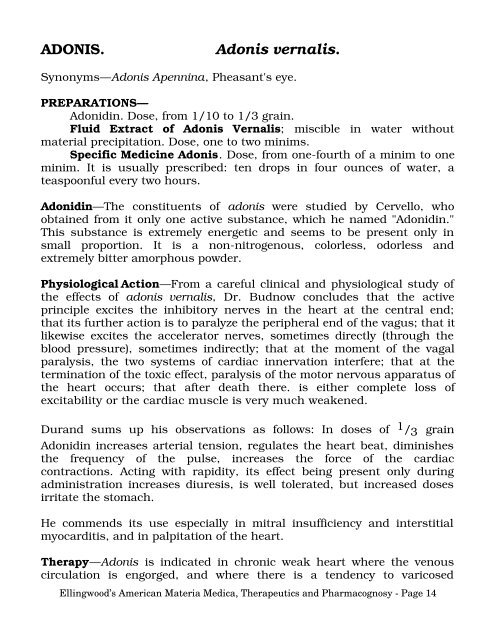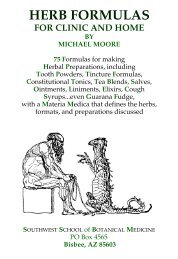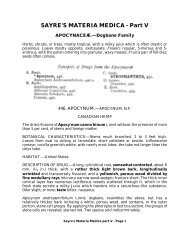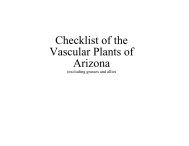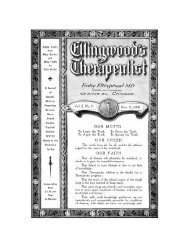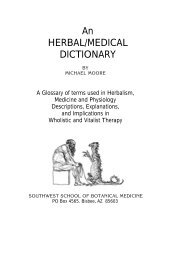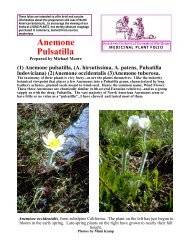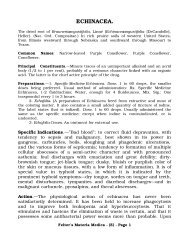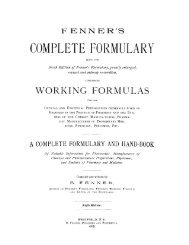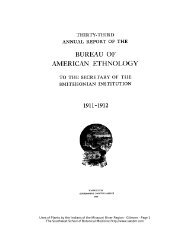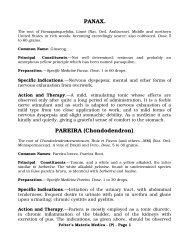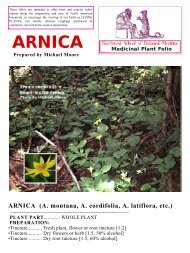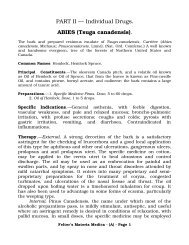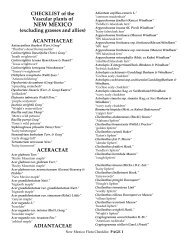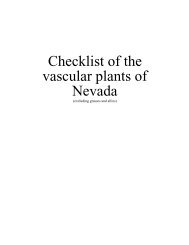- Page 1 and 2: American Materia Medica, Therapeuti
- Page 3 and 4: oil, full strength, may be applied
- Page 5 and 6: A syrup made from the leaves reliev
- Page 7 and 8: may be felt, and more or less delir
- Page 9 and 10: teaspoonful doses every hour is the
- Page 11 and 12: disease are removed and intestinal
- Page 13: Webster has used aconite externally
- Page 17 and 18: circulations and overcomes constipa
- Page 19 and 20: TRITICUM. Agropyron repens. Synonym
- Page 21 and 22: in atonic conditions of the nerves,
- Page 23 and 24: acts exceedingly well with helonias
- Page 25 and 26: ALOES. Aloes socotrina. Synonym—A
- Page 27 and 28: heavily coated tongue and constipat
- Page 29 and 30: PREPARATIONS— Tincture Amygdalus
- Page 31 and 32: intestinal canal, is that of an irr
- Page 33 and 34: headache, light and dull; restlessn
- Page 35 and 36: efficient. In tuberculosis, it has
- Page 37 and 38: acute cold it is a useful remedy. I
- Page 39 and 40: heart in complete systole, and in s
- Page 41 and 42: Pawinsky rarely met with unfavorabl
- Page 43 and 44: irregularity. The radial pulse was
- Page 45 and 46: The Removal of Dropsical Accumulati
- Page 47 and 48: Specific Symptomatology—Suppressi
- Page 49 and 50: pyelitis and in pyelonephritis. It
- Page 51 and 52: inflammation of any organ from trau
- Page 53 and 54: SANTONICA. Artemisia pauciflora. Sy
- Page 55 and 56: I was consulted concerning an irrit
- Page 57 and 58: The stimulant properties of this ag
- Page 59 and 60: It is also beneficial as a local an
- Page 61 and 62: sugar, salts. PREPARATIONS— Oleor
- Page 63 and 64: In the influence of this remedy upo
- Page 65 and 66:
In the therapeutics of all continue
- Page 67 and 68:
headache, with indisposition, malai
- Page 69 and 70:
Atropine. Atropine is the essential
- Page 71 and 72:
influence is positively enhanced by
- Page 73 and 74:
and upon the nutritive functions of
- Page 75 and 76:
the treatment. It should be used in
- Page 77 and 78:
Baptisin (a bitter glucoside), bapt
- Page 79 and 80:
continued. In the long protracted a
- Page 81 and 82:
BETULA. Betula alba. Synonym—Whit
- Page 83 and 84:
Agaricus acts upon the nerves of th
- Page 85 and 86:
inflammations of the thoracic visce
- Page 87 and 88:
temperature of 101 1/2 degrees. I d
- Page 89 and 90:
The drug is antiperiodic, febrifuge
- Page 91 and 92:
ten to twenty minims, and the solid
- Page 93 and 94:
It is an excellent remedy in gonorr
- Page 95 and 96:
Its influence upon the circulation
- Page 97 and 98:
infusion, capsicum and white- oak b
- Page 99 and 100:
In gastralgia, irritable stomach, n
- Page 101 and 102:
pungent. Dose, from five to ten dro
- Page 103 and 104:
The following is an excellent, simp
- Page 105 and 106:
This remedy as a partus preparator
- Page 107 and 108:
applied to ulcers of the os uteri.
- Page 109 and 110:
5. In the treatment of cases of Cra
- Page 111 and 112:
for a length of time. It has been b
- Page 113 and 114:
tonic. Where disorders of the stoma
- Page 115 and 116:
This agent operates in harmony with
- Page 117 and 118:
The oil of the herb and of the seed
- Page 119 and 120:
general bubonic inflammation. He be
- Page 121 and 122:
It will quickly overcome the jaundi
- Page 123 and 124:
of arterial pressure, vomiting or g
- Page 125 and 126:
of the back, in myalgia, in severe
- Page 127 and 128:
In the male it is valuable in gonor
- Page 129 and 130:
Quinine destroys the plasmodium mal
- Page 131 and 132:
essential importance in the reducti
- Page 133 and 134:
materially improve its local influe
- Page 135 and 136:
in water. Dose, from one-tenth to f
- Page 137 and 138:
The writer, for nearly thirty-five.
- Page 139 and 140:
ten or fifteen drops of dioscorea.
- Page 141 and 142:
Physiological Action—The natives
- Page 143 and 144:
heumatism, although it may be presc
- Page 145 and 146:
Collinsonia is a heart tonic of dir
- Page 147 and 148:
Shoemaker extols collinsonia in the
- Page 149 and 150:
CONIUM. Conium maculatum. Synonyms
- Page 151 and 152:
CONVALLARIA. Convallaria majalis. S
- Page 153 and 154:
conduces to rest and sleep, and ind
- Page 155 and 156:
COPAIBA. Copaiba langsdorffii. Part
- Page 157 and 158:
conditions of the glandular structu
- Page 159 and 160:
We should confirm or disapprove the
- Page 161 and 162:
other remedies are only palliative
- Page 163 and 164:
Dr. Jernigan experimented very exte
- Page 165 and 166:
It checks mild cases of irregular u
- Page 167 and 168:
In scrofulous children its action i
- Page 169 and 170:
every two hours. To the animals who
- Page 171 and 172:
or uterine disorders and is prompt
- Page 173 and 174:
In chronic skin disorders with mark
- Page 175 and 176:
temperature somewhat, and im. prove
- Page 177 and 178:
CONSTITUENTS—Saponin. PREPARATION
- Page 179 and 180:
dryness in the mouth and constricti
- Page 181 and 182:
This plant grows throughout the cen
- Page 183 and 184:
headache of a bursting character, a
- Page 185 and 186:
I think this sedative influence is
- Page 187 and 188:
Its use in cholera infantum has bee
- Page 189 and 190:
train of the symptoms supervened. H
- Page 191 and 192:
symptoms abated rapidly, and the pa
- Page 193 and 194:
Twenty to forty minims of echinacea
- Page 195 and 196:
Specific Symptomatology—This agen
- Page 197 and 198:
Therapy—A diuretic useful in supp
- Page 199 and 200:
the anemia. Ergot acts upon the hea
- Page 201 and 202:
muscular fibers. Mammary tumors, fr
- Page 203 and 204:
tendency to hemorrhage, and in a fr
- Page 205 and 206:
increased mucous discharges. As an
- Page 207 and 208:
It is especially valuable in chroni
- Page 209 and 210:
minims. Physiological Action—The
- Page 211 and 212:
similar color, indicating a cholago
- Page 213 and 214:
Specific Gravel Root. Dose, from fi
- Page 215 and 216:
following measles. It will prevent
- Page 217 and 218:
Therapy—It relieves general distr
- Page 219 and 220:
advised it in both acute and chroni
- Page 221 and 222:
head lowered. Therapy—In uterine
- Page 223 and 224:
elaxation is present, it is of serv
- Page 225 and 226:
congestion of the pelvic circulatio
- Page 227 and 228:
doses of two or three minims of the
- Page 229 and 230:
gelsemium for its influence here, i
- Page 231 and 232:
irritation, but belladonna acts upo
- Page 233 and 234:
stitchlike pains, in the deep muscl
- Page 235 and 236:
I have heard physicians say that th
- Page 237 and 238:
upon as a bitter tonic and constant
- Page 239 and 240:
the menstrual periods, continuing t
- Page 241 and 242:
It has a wide reputation among the
- Page 243 and 244:
torpor of the liver and spleen in t
- Page 245 and 246:
Specific Symptomatology—Soreness
- Page 247 and 248:
HELLEBORUS. Helleborus niger. Synon
- Page 249 and 250:
manifestations. The tongue is heavi
- Page 251 and 252:
Part Employed—The strobiles. CONS
- Page 253 and 254:
Thirty minims in two ounces of wate
- Page 255 and 256:
conditions of the heart muscle. In
- Page 257 and 258:
It is valuable in from one-fourth t
- Page 259 and 260:
Cuthberton gave hydrastis canadensi
- Page 261 and 262:
soothing influence, and for its sed
- Page 263 and 264:
Concussion, shock or injury to the
- Page 265 and 266:
the course of cough if there be gre
- Page 267 and 268:
It promotes waste, and elimination
- Page 269 and 270:
Therapy—It is indicated when ther
- Page 271 and 272:
eczema, the local use of the juice
- Page 273 and 274:
If Kalmia would relieve other cases
- Page 275 and 276:
extending down the inside of the th
- Page 277 and 278:
The preparation of lobelia which is
- Page 279 and 280:
supports the heart; it overcomes ex
- Page 281 and 282:
Because of the great importance pla
- Page 283 and 284:
cough and repeated if possible on t
- Page 285 and 286:
Spasm of the glottis has been contr
- Page 287 and 288:
the animals bitten by the same dog,
- Page 289 and 290:
and eliminative organs. Specific Sy
- Page 291 and 292:
In diseases of the respiratory appa
- Page 293 and 294:
Administration—The active princip
- Page 295 and 296:
tonic and corrective to disorders o
- Page 297 and 298:
Dr. Jennie M. Covert reports extrem
- Page 299 and 300:
He believes that a tea made of alfa
- Page 301 and 302:
In Asiatic cholera, oil of cajuput,
- Page 303 and 304:
cold and damp, with nausea and vomi
- Page 305 and 306:
tranquil condition, reflex symptoms
- Page 307 and 308:
MYRICA. Myrica cerifera. Synonyms
- Page 309 and 310:
There are universal chills, rose-co
- Page 311 and 312:
stomach when poisoning has occurred
- Page 313 and 314:
the size of the dose. It promotes t
- Page 315 and 316:
of the alkaloid morphine. It may al
- Page 317 and 318:
Codeine has a marked influence upon
- Page 319 and 320:
This agent is so convenient and pro
- Page 321 and 322:
if there be occasional quick, sharp
- Page 323 and 324:
injection of a few drops of a liqui
- Page 325 and 326:
aches and pains. Old rheumatics use
- Page 327 and 328:
inflammatory skin disorders with ne
- Page 329 and 330:
influence, and will therefore be fo
- Page 331 and 332:
eadily soluble in alcohol, sparingl
- Page 333 and 334:
upon it in these cases. It stimulat
- Page 335 and 336:
Physiological Action—Though the y
- Page 337 and 338:
Dr. Waska, of Chicago is a strong a
- Page 339 and 340:
It is a powerful anti-diphtheritic
- Page 341 and 342:
not been moved for three days, nor
- Page 343 and 344:
induces normal equilibrium. The dos
- Page 345 and 346:
Pilocarpine has a selective action
- Page 347 and 348:
A cigarette is prepared of cubebs,
- Page 349 and 350:
Morrill of Lincoln, Nebraska, is au
- Page 351 and 352:
The agent will relieve cerebral hyp
- Page 353 and 354:
Therapy—In susceptible patients i
- Page 355 and 356:
Plantago is of immediate benefit, D
- Page 357 and 358:
the name of the existing disease. I
- Page 359 and 360:
It causes a sensation of acridity i
- Page 361 and 362:
Inactive engorgements, or stagnatio
- Page 363 and 364:
Therapy-The agent is a hydragogue d
- Page 365 and 366:
PRUNUS. Prunus serotina. Synonym—
- Page 367 and 368:
Therapy—Kino is less used than fo
- Page 369 and 370:
the use of quassia, either alone or
- Page 371 and 372:
PREPARATIONS— Fluid Extract Casca
- Page 373 and 374:
induce some pain. The agent should
- Page 375 and 376:
Macerate the Rhubarb, Golden Seal a
- Page 377 and 378:
In many cases of urinary incontinen
- Page 379 and 380:
nervous twitching and wandering of
- Page 381 and 382:
correcting the brain phenomena. It
- Page 383 and 384:
the bowels with castor oil and to f
- Page 385 and 386:
with this remedy alone. SALIX Salix
- Page 387 and 388:
Therapy—The strong infusion is di
- Page 389 and 390:
and to other growths of a similar n
- Page 391 and 392:
SAXIFRAGE. Saxifraga pennsylvanica.
- Page 393 and 394:
SCUTELLARIA. Scutellaria lateriflor
- Page 395 and 396:
Cactus exercises a direct influence
- Page 397 and 398:
It may be given with excellent resu
- Page 399 and 400:
where six drops of specific cactus
- Page 401 and 402:
mitchella repens, and other agents
- Page 403 and 404:
eliable lady physician assures me t
- Page 405 and 406:
Physiological Action—Mustard is e
- Page 407 and 408:
these poultices. On the first day o
- Page 409 and 410:
DULCAMARA. Solanum dulcamara. Synon
- Page 411 and 412:
varieties of each wedge into each o
- Page 413 and 414:
SPIGELIA. Spigelia marilandica. Syn
- Page 415 and 416:
It has a specific influence in the
- Page 417 and 418:
een used in conjunction with lobeli
- Page 419 and 420:
In asthma the paroxysm is shortened
- Page 421 and 422:
A prominent writer states that nux
- Page 423 and 424:
muscles, resembling trismus, with c
- Page 425 and 426:
Strychnine Sulphate. Dose, from 1/1
- Page 427 and 428:
On the ground of these experiments
- Page 429 and 430:
patient up, placing her in an excel
- Page 431 and 432:
chronic cases. In inflammation of t
- Page 433 and 434:
any kind it is of service and will
- Page 435 and 436:
Thuja is directly indicated, first,
- Page 437 and 438:
serum. Then in order to cause the l
- Page 439 and 440:
distress. The case was cured in a f
- Page 441 and 442:
DAMIANA. Turnera aphrodisiaca. Syno
- Page 443 and 444:
colorless, nearly odorless; slightl
- Page 445 and 446:
atomizer for this purpose. In all t
- Page 447 and 448:
the morning. It may be followed sho
- Page 449 and 450:
entire condition in check for a tim
- Page 451 and 452:
eneficial in some forms of nervous
- Page 453 and 454:
The skin is usually soft and covere
- Page 455 and 456:
Other observers have spoken most hi
- Page 457 and 458:
In puerperal convulsions the mass o
- Page 459 and 460:
The agent has long been a domestic
- Page 461 and 462:
Therapy—Given prior to labor it i
- Page 463 and 464:
involution and assists in retaining
- Page 465 and 466:
It has long been known to exercise
- Page 467 and 468:
the urinary apparatus. Therapy—Dr
- Page 469 and 470:
Synonym—Ginger. CONSTITUENTS— V


